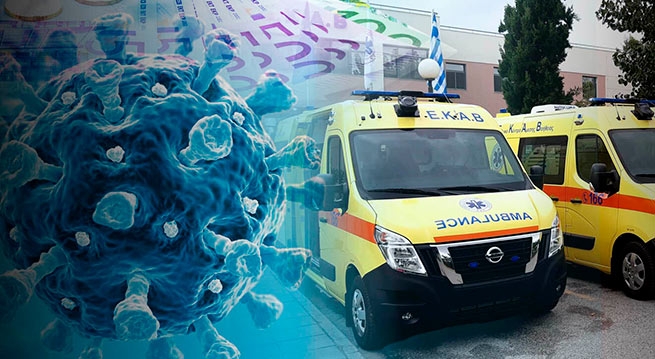The recent incidents in Kos and Nea Makri, where due to the lack of ambulances, people were dying without medical care, showed the real situation with the healthcare system in Greece. Given that 58 billion euros have been spent on pandemics and the “fight against covid”, the problem raises legitimate questions.
Of course, to be objective, the dismantling of the National Health System (which has always been problematic, but functioned quite tolerably until 2010) began with memorandums. It was they, or rather the austerity regime, that ruined the healthcare system in Greece.
Kyriakos Mitsotakis and his staff showed political reflexes, as immediately after the death of a 19-year-old pregnant woman in Nea Makri and a 63-year-old woman in Kos, the Prime Minister declared that the NHS was his personal bet. This reaction goes a long way to explain why New Democracy got 40% in the recent elections. He promised that the reform of the National Health System would be his personal stake and top priority.
And at this time, only 40-45 ambulances work in all of Attica. For almost 5 million inhabitants of the metropolitan area (not counting a number of private ambulances, which are beyond the reach of 95% of the country’s population).
Some of them serve emergencies, some – chronic, and some are in mobile units. About 35, however, are permanently immobilized due to breakdowns and lack of spare parts. As a result, people are dying because they are waiting for an ambulance for 5 hours at a distance of only … 20 km from the regional capital complex, that is, from the borders of the metropolis of Athens.
At the same time, according to doctors, at least 80-90 ambulances are needed for the region, that is, twice as many, and according to international standards, 120 ambulances are the norm. And this is in the capital. On the periphery, the situation is completely catastrophic.
In 2023, on a large tourist island (up to 150 thousand tourists in summer), there is actually 1 ambulance, and on many islands there is not even that. It turns out that in the event of an emergency, military helicopters or medical aviation from the capital will have to be sent to help? This would be expected in countries such as … Burundi, but this is happening in the country EU.
On the other hand, the management of the pandemic has been miserable, despite the huge amount of money spent. We have had unnecessary lockdowns that have put the society into a state of restraint and the economy into a recession. The government then introduced compulsory vaccination, dividing society into the vaccinated and the unvaccinated. Then it came into conflict with the doctors and nurses, as mandatory vaccination was forced on them too, with the usual reaction.
To overcome this reaction, the prime minister sent 58 billion euros of support measures to the market, which also received those who were not affected by the crisis. In addition, through the multimillion-dollar list of Petsas (and not only), he set the media to not criticize and thereby convey the narrative that the government had successfully overcome the obstacle in the form of a pandemic. During the pandemic, there were periods when we had more deaths relative to the population than countries with millions of people.
But despite the billions spent, the NHS is in tatters, and the ranches in emergency hospitals remain. At some point, we also faced a serious shortage of drugs in the Greek market, there were no everyday drugs such as antibiotics, etc.
The National Health System was not supported, recruiting 200 rescuers who were clearly needed.







More Stories
Today the world remembers the accident at the Chernobyl nuclear power plant
A trial has begun in the case of a fatal accident involving Dora Bakoyanni's car.
Poll: which European countries are ready to defend their homeland to the last